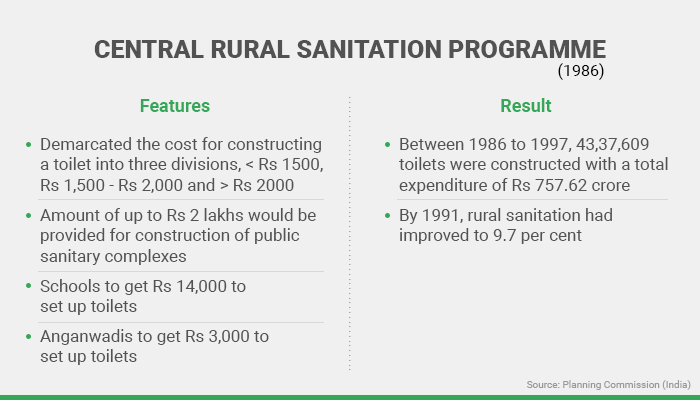Highlights
- First sanitation programme to provide subsidies for toilet construction
- The programe also addressed the need of toilets in schools and Anganwadis
- More than 4 million toilets were built in 11 years under the CRSP
In 1985, management of rural and urban water supply and sanitation was transferred from Central Public Health and Environmental Organization. The Ministry of Drinking Water and Sanitation (MDWS) was given charge of rural sanitation and water supply, while the Ministry of Urban Development (MoUD) was given charge of urban sanitation and water supply. The responsibility of rural and urban sanitation and water supply remain with these two ministries to date.
The first comprehensive national level sanitation programme was launched by then Prime Minister Rajiv Gandhi in 1986. Many of Swachh Bharat Abhiyan’s salient features are similar to the CRSP. The programme was the first of its kind to provide financial assistance to below poverty level (BPL) families for constructing individual household toilets (IHHLs). CRSP had demarcated the cost for constructing a toilet into three divisions, up to Rs 1500, between Rs 1,500 and Rs 2,000 and more than Rs 2000. The model most likely to be adopted by BPL families was the below Rs 1,500 one, for which the Union government’s contribution was 60 per cent of the cost, the state government’s was 20 per cent, and the rest was to be borne by the household. For above poverty level families, no financial assistance was allocated.
The programme also noted the importance of sanitary complexes for community spaces and stated that an amount of up to Rs 2 lakhs would be provided for construction of such toilets. The lack of toilets in schools and Anganwadis was also addressed in the programme guidelines, with schools promised to get financial assistance of up to Rs 14,000 and Anganwadis up to Rs 3,000. CRSP was also the first programme to address the issue of solid waste management in rural areas. Costs of new SWM projects were to be borne by the Centre, state and panchayat in the ratio of 60:20:20. Further, to inspire behavioural change, CRSP asked the Centre, states and local authorities to arrange for Information, Education and Communications (IEC) activities that would impart the importance of sanitation in rural people.

Under the CRSP, for the first time, a large number of toilets were built in rural India over a prolonged time period
CRSP was the first comprehensive sanitation programme India witnessed. The Centre constructed a framework that addressed nearly all issues related to rural sanitation. Keeping aside 25 per cent of the Central funds for SC/ST families, and making it mandatory that 3 per cent of the total toilets constructed for disabled people were some of the truly good features of the programme, said Sujay Majumdar, ex-Joint Secretary, Ministry of Drinking Water and Sanitation.
By 1991, rural sanitation had improved to 9.7 per cent. The Planning Commission estimates that between 1986 to 1997, over 40 lakhs (43,37,609) toilets were constructed with a total expenditure of Rs 757.62 crore.




























